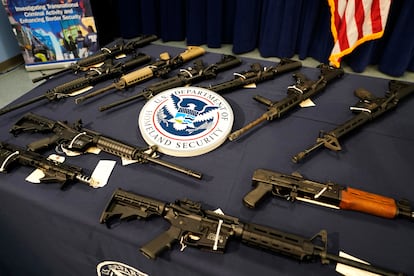UN report: Modern weapons being smuggled to Haiti from US
‘Popular handguns selling for $400-$500 at federally licensed firearms outlets or private gun shows in the US can be resold for as much as $10,000 in Haiti,’ the document said

Increasingly sophisticated weapons are being trafficked into Haiti mainly from the United States and especially from Florida amid worsening lawlessness in the impoverished Caribbean nation, according to a UN report released Friday.
The report by the Vienna-based Office on Drugs and Crime said a network of criminal actors including members of the Haitian diaspora “often source firearms from across the US” and smuggle them into Haiti illegally by land from the neighboring Dominican Republic, by air including to clandestine airstrips, but most frequently by sea.
“Popular handguns selling for $400-$500 at federally licensed firearms outlets or private gun shows in the US can be resold for as much as $10,000 in Haiti,” the report said. “Higher-powered rifles such as AK47s, AR15s and Galils are typically in higher demand from gangs, commanding correspondingly higher prices.”
The US Department of Homeland Security’s investigations unit reported “a surge in firearms trafficking from Florida to Haiti between 2021 and 2022″ and a spokesman described the recovery of increasingly sophisticated weapons destined for Haitian ports “including .50 caliber sniper rifles, .308 rifles, and even belt-fed machine guns,” according to the report.
“Weapons are frequently procured through straw man purchases in US states with looser gun laws and fewer purchasing restrictions” and then transported to Florida where they are concealed inside consumer products, electronic equipment, garment linings, frozen food items and even the hull of freighters, it said. “On arrival in Haiti, including major hubs such as Port-de-Paix and Port-au-Prince, cargo is offloaded and passed on to end-users via a host of intermediaries.”
The 47-page report, entitled “Haiti’s Criminal Markets: Mapping Trends in Firearms and Drug Trafficking,” cites the challenges of patrolling 1,771 kilometers (1,100 miles) of Haiti’s coastline and a 392-kilometer (243-mile) border with the Dominican Republic with national police, border and coast guard operations that are severely under-staffed, under-resourced and “increasingly targeted by gangs.”
The heavily-armed gangs are also targeting ports, highways, critical infrastructure, customs offices, police stations, courthouses, prisons, businesses and neighborhoods, the report said. And throughout 2022 and early 2023 they have expanded their control over key access points to cities including the capital Port-au-Prince.
“Many are also engaged in predatory behavior in communities under their control contributing to rising levels of extortion, sexual violence, kidnapping and fatal violence,” it said, citing an increase in homicides from 1,615 in 2021 to 2,183 in 2022, and a doubling of kidnappings from 664 to 1,359 during the same period.
The UN report said private security companies in Haiti are permitted to buy and keep arms, and while independent verification isn’t possible “specialists speculate that there could be 75,000 to 90,000 individuals working with roughly 100 private security companies across the country, at least five times the number of registered police officers.”
According to the UN Office on Drugs and Crime, Haiti has long been a trans-shipment hub to move cocaine, cannabis and to a lesser extent heroin and amphetamines to the United States and the Dominican Republic. The drugs mostly enter the country via boat or plane, arriving through public, private and informal ports as well as clandestine runways.
During the 2000s, the report said, drug traffickers moved illegal airstrips from the outskirts of Port-au-Prince northward to more isolated areas including Savane Diane, roughly 50 miles north of the capital.
When then-President Jovenal Moïse ordered the destruction of suspected clandestine airstrips in June 2021, UNODC said “local authorities refused.” A week later, he was assassinated.
Since the assassination, UN officials said gangs have grown more powerful, and gang violence has reached a level not seen in decades. In December, the UN estimated that gangs controlled 60% of Haiti’s capital, but most people on the streets in Port-au-Prince say that number is closer to 100%.
In late February, the UN condemned a new surge of gang violence in central Haiti.
Haiti was stripped of all democratically elected institutions when the terms of the remaining 10 senators expired in early January. No elections are on the horizon and Prime Minister Ariel Henry continues to plead for the deployment of foreign troops, a request first made in October. The international community has instead opted to impose sanctions and send military equipment and other resources.
Sign up for our weekly newsletter to get more English-language news coverage from EL PAÍS USA Edition
Tu suscripción se está usando en otro dispositivo
¿Quieres añadir otro usuario a tu suscripción?
Si continúas leyendo en este dispositivo, no se podrá leer en el otro.
FlechaTu suscripción se está usando en otro dispositivo y solo puedes acceder a EL PAÍS desde un dispositivo a la vez.
Si quieres compartir tu cuenta, cambia tu suscripción a la modalidad Premium, así podrás añadir otro usuario. Cada uno accederá con su propia cuenta de email, lo que os permitirá personalizar vuestra experiencia en EL PAÍS.
¿Tienes una suscripción de empresa? Accede aquí para contratar más cuentas.
En el caso de no saber quién está usando tu cuenta, te recomendamos cambiar tu contraseña aquí.
Si decides continuar compartiendo tu cuenta, este mensaje se mostrará en tu dispositivo y en el de la otra persona que está usando tu cuenta de forma indefinida, afectando a tu experiencia de lectura. Puedes consultar aquí los términos y condiciones de la suscripción digital.








































